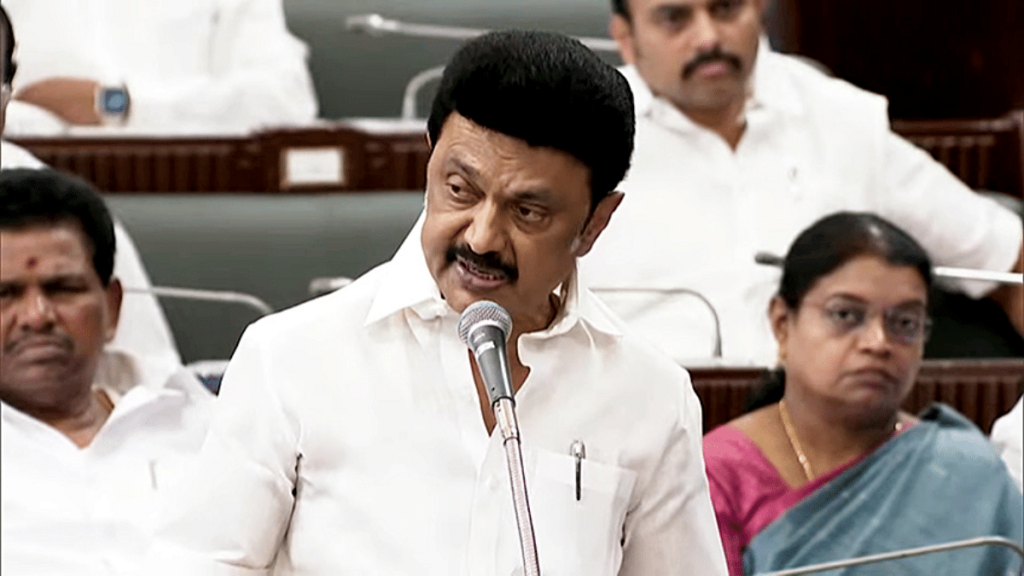Chennai: Tamil Nadu Chief Minister M.K.Stalin followed the foot-steps of his late father M. Karunanidhi, as he announced the formation of a high-level committee to examine and recommend measures to strengthen state autonomy and enhance Centre-State relationship as enshrined in the Constitution.
The announcement comes exactly 50 years after Dravida Munnetra Kazhagam (DMK) patriarch Karunanidhi, a five-time chief minister, passed the state autonomy resolution in the assembly on 16 April 1974.
“At a time when no other state in India had taken such initiatives, nearly half a century ago, in 1969, our revered leader Kalaignar (read, Karunanidhi), as chief minister, constituted a high-level committee under the chairmanship of retired chief justice P.V. Rajamannar to examine Union-state relations,” Stalin recalled Tuesday in the assembly.
The newly formed high-level committee headed by retired Supreme Court judge Justice Joseph Kurian will have former IAS officer and former vice-chancellor of Maritime University Ashok Vardhan Chetty and former vice-chairman of Tamil Nadu State Planning Commission Professor M Naganathan.
After reviewing the constitutional provisions, Stalin told the assembly that the panel would submit its draft report by January next year and a comprehensive report within two years.
The high-level committee, he said, would examine constitutional provisions, laws, orders, policies, and arrangements affecting Union-State relations, and reassess them and recommend measures to restore the subjects shifted from State List to the concurrent list.
It would also address challenges in delivering good governance and “recommend steps to ensure maximum state autonomy in administration, legislatures and judiciary without compromising national unity”
An IAS officer told ThePrint that the panel would also consider the Rajamannar Committee’s recommendations submitted in 1971, along with political, social, economic and legal developments since then.
The Rajamannar Committee had identified imbalances in the Centre-State relations and made several recommendations-to transfer education, agriculture and public health from the Concurrent list to the State list, increase states’ share of Union tax revenue and grant them greater taxing powers, among others.
Based on the recommendations made, then Tamil Nadu chief minister M Karunanidhi wrote to then prime minister Indira Gandhi. However, none of the proposals were considered. Nevertheless, later, in 1983, Indira formed the Sarkaria Commission to review and analyse the Centre-State relationship, which submitted its report in 1987.
Stating that the committee is not just for Tamil Nadu’s welfare, Stalin told the assembly that it is to protect the rights of all the states.
“Tamil Nadu’s push for the right to implement welfare schemes and secure adequate funds for its remotest villages applies equally to the states like Kerala, Telangana and Karnataka. Our demand for equitable power-sharing and financial devolution is not just for Tamil Nadu but for all the states, from Gujarat to the Northeast, from Kashmir to Kerala,” Stalin said, adding that the first voice for state autonomy will always rise from Tamil Nadu.
As the CM was reading the resolution in regard to the state autonomy, members of the All India Anna Dravida Munnetra Kazhagam (AIADMK) headed by former minister R.B. Udhayakumar walked out of the assembly stating that they were not given time to move a no-confidence motion against ministers K.N. Nehru, Ponmudi, and Senthil Balaji.
After the resolution for formation of the committee was passed in the assembly, BJP members headed by its legislative leader and state president Nainar Nagendran walked out of the assembly.
Nagendran alleged the DMK of propagating separatist views in the assembly. “Our view is that full autonomy and complete authority cannot be given to the states. That’s why we staged a walkout. The DMK is indulging in separatist talks. They want a separate Tamil Nadu it seems. Only if the states are united, a country can become a superpower,” he told reporters.
Also Read: Stalin recalls ‘communist roots’ on stage with Pinarayi as the CMs vow to protect federalism
‘Centre withheld funds for SSA’
Announcing the formation of the committee, Stalin also took a dig at the Centre for diluting the policies on education.
“Considering social justice, economic equity, and opportunities for the oppressed, Tamil Nadu’s education policy ensured that our students could pursue medical education. However, the imposition of a single entrance exam, NEET, under the Union Government’s control has diluted our policy,” Stalin told the assembly.
Alleging that the Centre was attempting to impose Hindi through the National Education Policy (NEP) 2020, Stalin recalled that the central government has withheld Rs 2,500 crores which were meant for Tamil Nadu under the Samagra Shiksha Abhiyan (SSA).
Stalin also pitched for bringing education to the State list from the Concurrent list “to preserve the linguistic, ethnic and cultural uniqueness of states.”
“As India’s second-largest economy and a major contributor to the Union’s tax revenue, Tamil Nadu receives only 29 paise for every rupee it contributes—a grossly inadequate share. Even during natural calamities, despite repeated requests and assessments, Tamil Nadu has not received adequate compensation,” Stalin said.
Stating that the states are bearing immense responsibility of driving India’s progress in education, healthcare, rural and urban development, he alleged that “the powers needed to fulfil the duties are stripped from states and centralised by the Union government”
“Only a mother knows what food her hungry child needs. If someone in Delhi decides what a child eats, learns, or the path it takes, won’t the compassionate mother rise in rage?” he asked.
(Edited by Tony Rai)
Also Read: United States of South India—Stalin’s push against delimitation goes beyond Tamil Nadu politics


